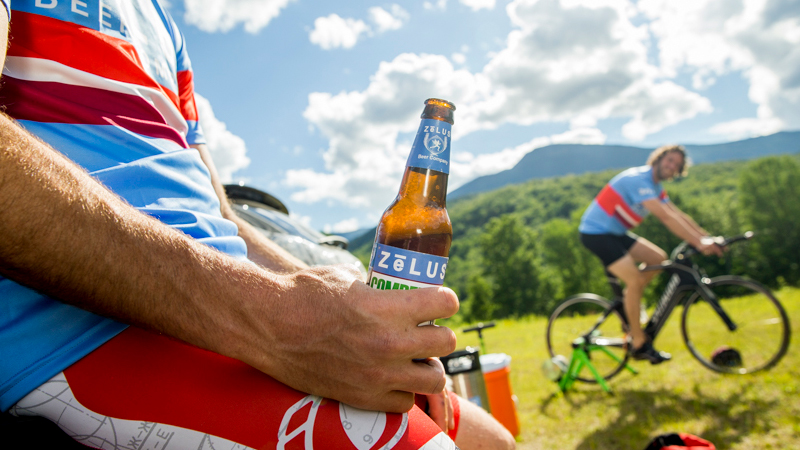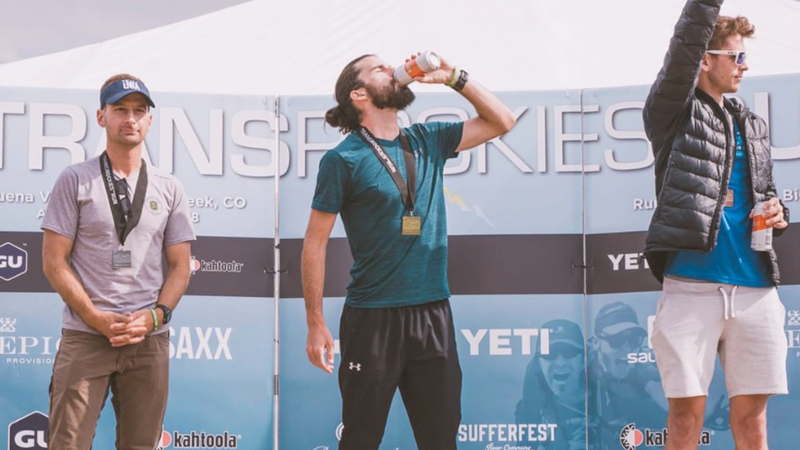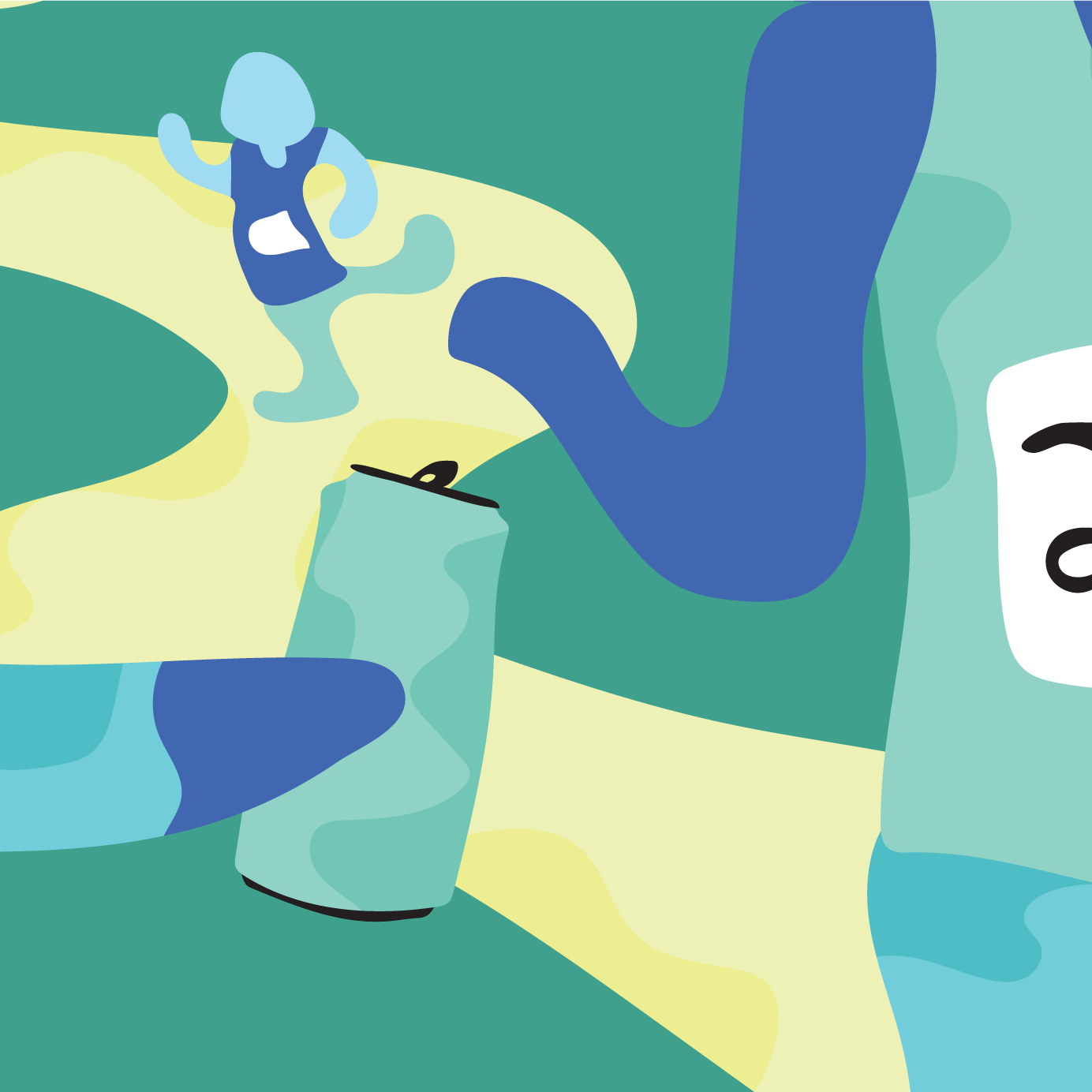“It is hard work and sometimes a pain to train,” Caitlin Landesberg, a runner and the founder of Sufferfest Beer Company in San Francisco, says. “Beer helps balance that.”
Landesberg created Sufferfest because she wanted a celebratory, somewhat healthy drink to toast a race with her friends. Sufferfest beers are brewed with extra magnesium, potassium, and salt, among other things, with athletes in mind.
“As I started learning the fundamentals of brewing, I realized no wonder we crave beer after a race,” Landesberg says. “It’s a highly fibrous beverage with natural ingredients, B6 and B12, iron. It’s 90 percent water with antioxidants, and even has anti-anxiety benefits.”
After years of being associated with couch potatoes, or used disparagingly alongside the word “gut,” beer is now the preferred drink of those with active lifestyles. Cold beers greet runners at the finish line of long races. Breweries are base camps for biking clubs and host Sunday morning yoga classes.

Scroll through Instagram and take a look at your friends who are hiking, skiing, or performing any other physical activity. Chances are they’re sipping cans on the summit or toasting cold ones at the peak.
Suds With Benefits
Melanie Fox, co-founder of Work For Your Beer, an online directory for beer fitness activities in North Carolina, thinks beer appeals to those seeking a measured way to let loose.
“People are looking for balance in their lives,” Fox says. “There’s something about working your ass off and then rewarding yourself with a cold beer that just feels good.”
Geoff Pedder agrees. He founded Massachusetts-based ZēLUS Beer Company with the goal of producing hydration-friendly beers for those with active lifestyles. And, like a lot of athletes, Peddler views post-race beers as a reward or target.
“If I go for a run, and I know there is a beer waiting for me when I finish, I may run a little faster,” he says.
Omission Brewing Company, founded in 2012, targets athletes with its Ultimate Light beer. “It’s refreshing and has great flavor, and is light in body so it won’t make you feel like you’ve just undone your hard work,” brewmaster Joe Casey says.
Goose Island tested a wheat ale infused with electrolytes earlier this year as well. Tim Faith, Goose Island’s R&D brewmaster, told VinePair he has experimented with taking electrolytes in all sorts of forms “during and after” a run or race. “But I usually consume beer after my runs, too,” Faith wrote in a message, “so that’s why making an electrolyte beer just made sense to me.”
Faith notes that many salts endurance athletes use to restore hydration after a workout are already present and used in beer, such as calcium chloride, calcium carbonate, gypsum, and more.
Peddler says he carefully selected brewing salts to give ZēLUS beers a deliberate balance of calcium, potassium, and sodium. He also made sure all six ZēLUS beers, including Race Pace New England IPA and Lyte Speed Hopped White Ale, clock in at 5 percent ABV or less.
Keeping beers sessionable is key, according to Beech Mountain Brewing Co. head brewer Will Young. “These beers can afford the consumer the opportunity to enjoy more than one without the concern of overindulgence,” Young says. This means they can “relish in the day’s adventure” even longer.
Young’s brewery is quite literally on the site of Beech Mountain Resort, a North Carolina ski resort. The property is all about outdoor activities, such as skiing, snowboarding, mountain biking, you name it.
“People who lead an active outdoor lifestyle are fun-loving people with an excitement for life and adventure,” Young says. He sees parallels with beer culture, calling it young, fun, and vibrant.
Adventureland
Endo Brewing Company in Lafayette, Col0., does double-duty as a combination brewery and bike shop. Owners Bob Lichens and Kevin Van Winkle have organized bike trips for more than 15 years.
“Each ride there was always the assumption that we’d be stopping somewhere for beers,” Lichen says, “So the idea of beers and bikes going so well together just came naturally for us.” He believes beer-drinking is social in a way similar to cycling, running, and rafting. A beer stop on the way home from the rapids or post-ride brewery visit is an extension of athletic camaraderie.
“Breweries are embracing beer lovers’ interest in ‘earning their beer’ by leveraging open-source activity business models in their breweries,” Andy Sparhawk, Brewers Association craft beer program manager, says.
Avery Brewing Company in Boulder, Col0., embraces that interplay of sports and suds. It hosts a weekly fun run, and recently released Go Play IPA, brewed with potassium and sodium — a beer that founder and CEO Adam Avery has been dreaming of creating for years.
Avery spends most of his time outside the brewery rock climbing and bike riding, and wanted a beer to match the obsessive passion for these sports. “It needed to be full-flavored and bold, but still easy to drink, low-ish ABV, and the perfect companion to any sweaty activity,” Avery says.
“So many people share photos on Instagram or Facebook of them cracking open an Avery Brewing beer at the top of a mountain or after an outdoor adventure,” Vanessa Cory, communications manager at Avery Brewing Company, says.
Even Boston Beer Company got in on the action with its popular Boston 26.2 Brew, created for the Boston Marathon. Brewer Megan Parisi, who has completed the marathon herself, describes the brew as unfiltered wheat ale with a light body and lower ABV, but also full of character and flavor. “Bostonians look forward to the annual release and visitors from all over the world seek it out when they are in Boston for the marathon,” Parisi says.

Is It Actually Good for You?
Beer, even low-alcohol beer, is definitely not a replacement for water. If you’ve done anything to break a sweat, your body is already a little dehydrated, and alcohol in any dosage will only dehydrate you further.
“I still believe water and electrolytes are the preferred method of rehydration,” Laura Ligos, RDN, CSSD, says. “I’m not saying you can’t have your beer and drink it, too, but water, electrolytes, and sports drinks as needed should be the first step in rehydrating after exercise always, end of story.”
While some might argue what beer brings to an athlete’s table, bike stand, finish line, or summit is less about health and more about camaraderie, moderation is always key. Drink water alongside your brew, regardless of its ABV, or electrolyte or salt content.
“Once rehydration methods have been put into place, then, great, have a beer,” Ligos says.
